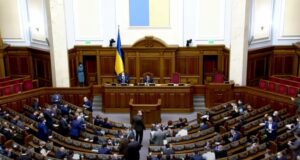
Ukrainian President Vladimir Zelensky has registered in the Verkhovna Rada bills “On extending martial law in Ukraine” and “On extending the period of general mobilization.”
The cards of bills No. 9259 and No. 9260 appeared on the parliament’s website on Monday evening.
The texts of the documents have not yet been made public.
As reported, Golos faction member Yaroslav Zheleznyak indicated that martial law and mobilization in Ukraine will probably be extended for 90 days – from May 19, 2023 to mid-August.
Earlier, on February 7, the Rada extended martial law and general mobilization in Ukraine for another 90 days (from February 19, 2023).

The Parliamentary Committee on Finance, Tax and Customs Policy on Tuesday recommended that draft laws No. 8298 and No. 8299, which exempt the import of equipment and components for own production from VAT and duties until the end of martial law (MP), be passed as a basis, the committee head Daniil Hetmantsev said in a telegram.
“The Ministry of Finance did not support almost the entire law … During the committee noted that without the agreement of the IMF this bill will not be adopted. Negotiations with the IMF on this law have not yet been held,” the deputy head of the committee Yaroslav Zheleznyak indicated in Telegram.
As specified Getmantsev, the bills also include preferential rent for iron ore and water for the period of the EaP, as well as single tax benefits for the taxpayers of Group 4.
In addition, it is planned to extend the life of the registered EDR, which had such a term expired during the EaP, as well as the abolition of taxation for electronic stamps and digital postage stamp and services for the demonstration and demonstration of films with Ukrainian dubbing.
“My prediction is that we will never accept it as a whole in this volume, precisely because of the IMF position,” Zheleznyak said.

The Verkhovna Rada has improved the procedure for preparing bills on adapting Ukrainian legislation to the provisions of European Union law (EU acquis).
Draft resolution No. 7595 was supported by 297 MPs at the plenary session on Friday, parliamentarian Yaroslav Zhelezniak (the Holos parliamentary faction) said on his Telegram channel.
The resolution provides for the consideration of bills aimed at adapting the legislation of Ukraine to the provisions of the law of the European Union, the fulfillment of Ukraine’s international legal obligations in the field of European integration, the availability of tables of correspondence to them, as well as official translations of relevant acts of EU legislation and / or other sources of EU law.
According to the resolution, subcommittees will be created in the committees of the Verkhovna Rada to adapt the legislation of Ukraine to the provisions of EU law, the implementation of Ukraine’s international legal obligations in the field of European integration.
The resolution also provides for an additional examination of the compliance of European integration bills with Ukraine’s international legal obligations in the field of European integration and EU law in the Parliamentary Committee on European Integration and / or in the Cabinet of Ministers.
adapt, BILLS, EU stantards, LEGISLATION, UKRAINIAN PARLIAMENT

The US House of Representatives passed a number of bills related to the situation in Ukraine on Wednesday, The Hill said.
One of the bills is aimed at alleviating the debt burden of Ukraine. Some 452 congressmen voted for it, while 56 voted against.
The document instructs the U.S. Treasury Secretary to seek from U.S. representatives in international financial organizations, including the IMF and the World Bank, the immediate suspension of debt service payments by Ukraine and the provision of financial assistance to Kyiv on favorable terms.
The second bill seeks to require the U.S. executive branch to seek to the fullest extent possible the exclusion of Russian officials from participation in meetings, meetings and other events of the G20, the Basel Committee on Banking Supervision, the Financial Stability Board, the International Insurance Association supervisors and the International Organization of Securities Commissions.
Some 416 congressmen voted for this project, while two voted against.
The third bill concerns the need for U.S. financial institutions to comply with U.S. sanctions against Russia and Belarus. It was approved by 418 votes.
According to the congressional database, all three documents must now go to the Senate for consideration.

MP Oleh Dunda (the Servant of the People faction) registered in the Verkhovna Rada bills on reforming the State Architectural and Construction Inspectorate and enhancing liability for violations in the urban planning sphere.
Relevant bills No. 5071 and 5072 were registered by the MP in the Verkhovna Rada on February 16, the website of the parliament said.
According to the explanatory note to bill No. 5071, which is available to Interfax-Ukraine, the bill provides for the introduction of phased state control over the construction process, which is carried out by local self-government bodies. State supervision is carried out by the central body of state power, which ensures the formation and implementation of state policy in the field of construction, one of the deputy ministers is also the chief inspector of the state urban planning supervision.
The bill also proposes to expand the range of entities providing services in the construction sector, subject to their certification. In addition, compulsory liability insurance is provided for certified persons in the field of urban planning (architects, design engineers, technical supervision, experts, etc.).
According to the provisions of the bill, a building permit will be granted if there is a positive conclusion of a comprehensive examination of design documentation, posted in the register with the qualified signatures of an expert organization.
Commissioning of facilities of CC1 class is carried out on the basis of an act of readiness of the facility, drawn up after its inspection in the presence of the customer, and signed by the technical supervision engineer and the author of the construction project. In the case of CC2 and CC3 class facilities, registration of a free state certificate of acceptance of the facility into operation is also carried out, which is formed after the signing of the act of readiness by the contractor, the head of the expert organization, experts and the insurer. These documents are also included into the register.
In turn, bill No. 5072 provides for an increase in fines for violation of legislation, building codes and regulations, including during planning and development of territories, violation of environmental safety rules, failure to comply with legal requirements of officials of state construction control and supervision, as well as personify liability for these violations.
In addition, it is proposed to introduce administrative liability for violations in the issuance of expert conclusions, author’s and technical supervision, performance of work without a qualification certificate or insurance contract, etc.
Criminal liability is provided for the issuance of a deliberately unlawful expert conclusion, violations by the executors of urban planning activities, non-implementation of state control and supervision, indicated in the explanatory note.

The National Bank of Ukraine (NBU) on December 20 introduced into circulation the upgraded 50-hryvnia bills, as well as 5-hryvnia coins that will gradually replace the respective banknotes, the NBU has reported on its website.
According to the report, first of all, the NBU intends to introduce 5 million of 50–hryvnia banknotes and 5-hryvnia coins. The first batch of means of payment had already been distributed to NBU regional offices.
The NBU has catered to the needs of the public, since customers will not be required to exchange the current 5- and 50-hryvnia bills for new coins and banknotes. No time limits will be imposed on the simultaneous use of new and previous banknotes in payments.
The 5- and 50-hryvnia banknotes of the previous design will be gradually replaced with coins and new banknotes as they wear out. The number of upgraded bills and coins will gradually increase in circulation, depending on the economy’s needs, the bank said.
The NBU said that the introduction of into circulation the upgraded 50-hryvnia bills and 5-hryvnia coins is a part of optimizing and upgrading the banknote and coin series of hryvnia.
Since 2014, the NBU has been upgrading the hryvnia and streamlining cash settlements. Optimization of the banknote and coin series of hryvnia is expected to be completed in 2020 after 200-hryvnia banknotes are introduced into circulation alongside 10-hryvnia coins. Due to comprehensive changes, eventually, the hryvnia series will be optimized to 12 denominations. The new denomination series will have six coins (10 and 50 kopiikas, and 1, 2, 5, and 10 hryvnias) and six banknote denominations (20, 50, 100, 200, 500, and 1,000 hryvnias).